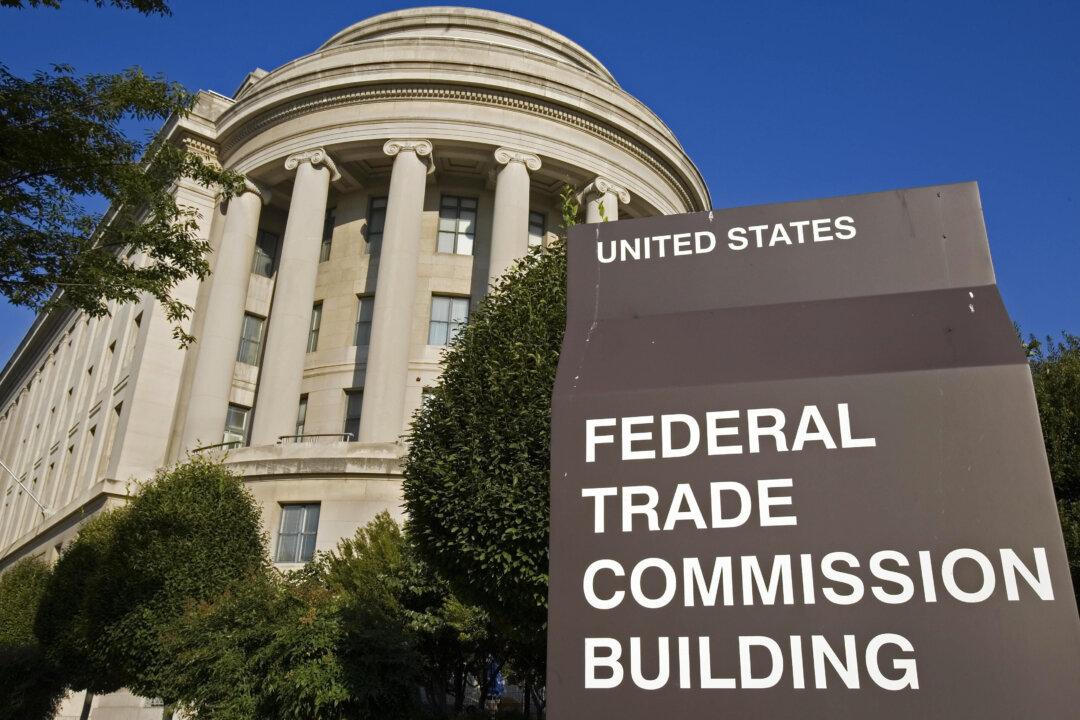Commentary
The Federal Trade Commission (FTC) was established with massive bipartisan support in 1914 to fight monopolies. But under the Biden administration, this powerful government agency has become something like a police force favoring the most dangerous form of monopoly: that which prevents competition in free expression.
Although there were differences on whether to regulate or force the break-up of large corporations, opposition to monopolies was a position shared by the nominees for president in 1912. Woodrow Wilson’s Democratic Party platform wanted “to make it impossible for a private monopoly to exist in the United States.” William Howard Taft’s Republican platform declared that “no part of the field of business opportunity may be restricted by monopoly”; and the new Progressive Party of former president Theodore Roosevelt, who came in second to Wilson and ahead of Taft that November, backed “the establishment of a strong federal administrative commission of high standing, which shall maintain permanent active supervision over industrial corporations engaged in interstate commerce.”
Indeed, the initial idea for the FTC came from a Republican, Rep. Dick Thompson Morgan of Oklahoma, early that presidential election year.
The FTC today declares in its mission statement that it exists to “promote competition” as “the only federal agency that deals with consumer protection and competition issues in broad sectors of the economy.” And it boasts that “every day, we pursue strong and effective law enforcement against deceptive, unfair, and anti-competitive business practices.”
But when Tesla CEO Elon Musk executed his complicated and expensive purchase of Twitter, heralding the "de-woke-ification” of the social media giant, the FTC bullied the company, demanding to know the names of journalists with whom it was communicating. As House Judiciary Chairman Jim Jordan (R-Ohio) and Senate Commerce Committee ranking member Ted Cruz (R-Texas) wrote in a joint letter to FTC chairwoman Lina Khan, “The FTC’s investigation of Twitter tracked public pressure from congressional Democrats and left-wing activists,” including seven Senate Democrats suggesting civil penalties and financial liabilities for Twitter executives, and the liberal Open Markets Institute, for whom Khan had worked, calling on her to move against Twitter.
FTC attorneys demanded that Twitter provide the names of “all journalists and other members of the media” who were “granted any type of access to the company’s internal communications … Resources, internal documents, and/or files since Oct. 27, 2022.” Jordan and Cruz are now asking Khan to provide a written explanation why it’s making such a demand. The two members of Congress also seek all communications of FTC officials among themselves, with outside entities, with the White House, and with other executive branch agencies pertaining to its Twitter investigations.
In the aftermath of data breaches in 2009, Twitter had entered into a consent decree with the FTC in 2011, which was expanded last year in regard to Musk’s purchase. But the agency has misused its consent decree enforcement to the extent even of trampling on the First Amendment’s freedom of the press.
Last week’s House Judiciary Committee report on the FTC’s abuse of its powers against Musk’s new acquisition described “an aggressive campaign to harass Twitter and deluge it with demands about its personnel decisions in each of the company’s departments, every internal communication relating to Elon Musk, and even Twitter’s interactions with journalists” with “no basis in the FTC’s statutory mission.” In more than a dozen letters to Twitter over the course of less than three months upon Musk buying the company, the FTC made in excess of 350 detailed demands. “The timing, scope, and frequency of the FTC’s demands to Twitter,” according to the report, “suggest a partisan motivation to its action.”
For instance, why would the FTC need every internal communication “relating to Elon Musk” by any Twitter employee since his purchase of the firm, including those sent or received by Musk, whatever the subject matter? Twitter’s consent decree was an agreement to help better protect its users’ privacy after the data breach in 2009, so the agency has authority to oversee Twitter’s protection of phone numbers, email addresses, and other private user info. But why would the FTC need the identities of journalists engaging with Twitter to protect consumers?
It doesn’t, of course. The FTC has joined the FBI as another politically suspect part of the federal government seeking to do the bidding of the ever-more radicalized Democratic Party. The new Twitter won’t be suppressing New York Post stories on Hunter Biden’s laptop and the Biden family’s ties to China with Musk running the platform, nor will it be suspending the accounts of Republican politicians who violate leftist informational orthodoxy. And for the Washington “swamp,” that is not tolerable.
The break-up of that monopoly of thought within the dominant communications establishment threatens the left’s hold on power, and so this agency established to smash monopolies is now betraying its founding principles and purpose for being, waging war in defense of a monopoly on our most valuable commodity: public discourse.





